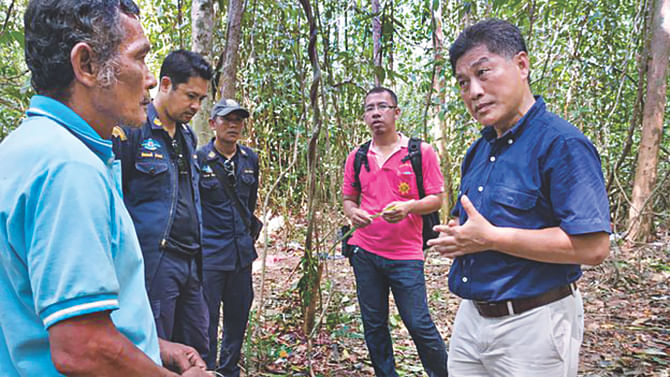Thai man on a mission
Thai man on a mission

Manit Pianthiong, district chief of Takua Pa in South Thailand, got the job nine months ago. But he is all too familiar with the human trafficking which goes on along the indented coastline of Takua Pa.
Pianthiong says he is trying to curb all forms of smuggling, but he is focusing in particular on the human trade, which he says is damaging the image of the entire country.
He encourages people in fishing communities along the coast to alert him to any signs of large groups of people being held. That is how he heard about these three groups of mainly Bangladeshi men, and a few Rohingyas.
The first group of 37 was found last month. Then, on October 11, his men tracked down another group of 53.
The last group, of 81, was surrounded in a forest camp near the road on October 13. They had been driven by their guards from one camp to another in an attempt to evade the authorities. Pianthiong believes many more were not rescued, and may have been sold.
Two of the guards have now been detained. One of them was identified by the Bangladeshis as the most brutal of their captors, a man they called Keke.
Whether this man and his bosses will be brought to justice, depends on the government in Bangkok.
ILLEGAL IMMIGRANTS
Pianthiong said he wants to go after the trafficking kingpins in the region, people with powerful connections. But that would require him to get much stronger backing, and so far that is not happening.
Senior figures in the police and the social welfare ministry are resisting his efforts to have all the Bangladeshi men classified as victims of trafficking.
The second group of 53 has already been given that status, which gives them proper support and shelter, and would allow them to go back to Bangladesh quickly.
However, the police are talking about reversing that decision. Instead, they want then to be jailed as illegal immigrants.
It is difficult to know why they want this outcome, for people who have all the appearance of victims.
Perhaps it is to avoid having to admit that trafficking continues in Thailand. Perhaps it is because they are reluctant to go after the trafficking kingpins.
The result, though, could be disastrous for the Bangladeshis. People have been known to be stuck in Thai immigration prisons for many years. In the case of Rohingyas, some were actually sold back to human traffickers.
How Thailand handles the case of these men will surely be a test of its declared willingness to turn its back on a shameful record of trafficking, and take meaningful action to end the trade in people.
[From an article by Jonathan Head, BBC's Southeast Asia correspondent]